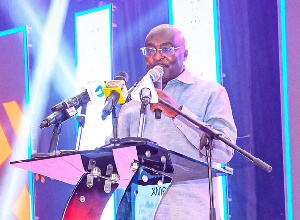- Home - News
- Polls
- Year In Review
- News Archive
- Crime & Punishment
- Politics
- Regional
- Editorial
- Health
- Ghanaians Abroad
- Tabloid
- Africa
- Religion
- Election 2020
- Coronavirus
- Photo Archives
- News Headlines
- Press Release
General News of Friday, 14 August 2009
Source: Bloomberg
Plans to Select Natural-Gas Plant Partner
The government plans to select an investor for a $1 billion natural-gas processing plant project by “late August or early September,” the Energy Ministry’s head of upstream petroleum said.
The Ghana National Petroleum Corp., a branch of the ministry, invited bids from prospective investors in May. The state-owned company received about 10 applications, Kwaku Boateng said in an interview yesterday in the capital, Accra.
“All were outside though some have local partners,” he said, declining to name any bidders.
Ghana is set to become one of Africa’s newest oil exporters in late 2010 when production begins at the offshore Jubilee field, which was discovered in June 2007 and has potential resources of as much as 1.8 billion barrels, according to Tullow Oil Plc, the biggest investor in the venture.
The West African nation expects to produce about 500,000 barrels of oil a day by 2014. The gas-processing plant, to be built in Ghana’s Western region, will be fed with gas from the Jubilee oil field.
While the government had hoped the plant would be ready by the fourth quarter of 2010 to coincide with the start of oil production, that timeline is “unlikely,” Boateng said.
“Realistically, middle of 2011,” he said.
The Jubilee field’s producers, which also include Ghana National Petroleum, Kosmos Energy LLC and Anadarko Petroleum Corp., plan to invest $3.1 billion in the Jubilee project. In July, Tullow said the field will make Ghana one of the world’s top 50 oil producers.
‘Zero Gas Flaring’
Ghana will adopt “a policy of zero gas flaring,” Boateng said. If the plant isn’t ready by the time oil pumping begins, producers will store the gas until it can be used.
Ghana is also looking at expanding its domestic oil- refining capacity, Boateng said.
The state-owned Tema Oil Refinery Ltd., the country’s only refiner, can produce as much as 45,000 barrels of oil products per day for the domestic market. The government plans to expand that to 145,000 barrels a day by raising cash or bringing in a “strategic investor” for a joint venture, Boateng said.
Ghana may also “build a completely new refinery,” he said, without providing further details.
Separately, two foreign companies have submitted bids to build export-focused refineries in the Western region, Boateng said. He didn’t elaborate.
Entertainment

Bawumia’s $80 bn market value claim for Spotify, false!
Opinions







